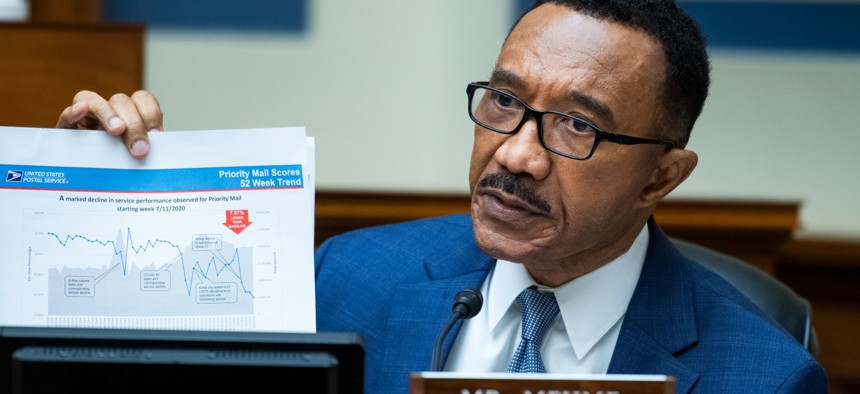Former SBA officials press Congress for a more accessible 8(a) program

Rep. Kwesi Mfume (D-Md.) at an August 2020 House hearing. Tom Williams/Getty Images
Former officials from the Small Business Administration, lawmakers and small business owners alike have all called for a series of major reforms they say will greatly improve the agency's landmark business development program.
Small business owners and former officials urged lawmakers to reduce administrative burdens complicating access to the Small Business Administration's 8(a) program on Wednesday, in addition to a series of other recommendations for the nine-year business development initiative.
The House Small Business Committee's Subcommittee on Contracting and Infrastructure heard from experts as Congress works to achieve the White House administration's goal of expanding the share of federal contracts awarded to small, disadvantaged businesses from 5% to 15% by 2025. One former SBA official suggested the agency focus more on expanding access to the program for disadvantaged businesses, rather than penalizing those who fraudulently attempt to gain entry, in order to achieve those goals.
Jackie Robinson-Burnette, CEO of Senior Executive Strategic Solutions and a former SBA senior program executive, said the agency should "shift their focus to include every firm that is eligible" for the 8(a) program, adding that, when she served at the SBA in 2017, the SBA was receiving over 2,000 applications for the program, while only accepting nearly 300 participants annually.
"Right now, the focus is making sure they mitigate the risk of firms getting into the program that shouldn't be in the program – focusing on the fraud – when really that's 1% or 2% of firms that apply," she said. "The other 90-plus percent of firms are struggling to get in … because the SBA is focused on the wrong thing."
Lawmakers questioned whether the nine-year program provided small businesses enough time to mature to the point where they can successfully compete against larger businesses for government contracts. Subcommittee chairman Rep. Kweisi Mfume (D-Md) said business owners have reported concerns with the length of the program and how it takes most firms multiple years to receive their first awards.
"This hinders the development of program participants and raises the question of whether enterprises are ready for graduation when they exit the program," he said.
Darryl Hairston, the SBA's former associate administrator of business development, said he previously submitted a proposal to redesign the 8(a) program several years ago which factored into account the complexities small businesses face in navigating the federal marketplace during their first years in the program.
"One of the things that we talked about was that most firms coming into the program, who are truly eligible for the program, had little experience in the federal marketplace," Hairston said, adding that the "timeframe is highly dependent upon how successful you are coming into the program and how well you take off with the benefits that are available to you."
Several witnesses suggested providing disadvantaged firms full-time executive support through the Office of Federal Procurement Policy, as well as offering priority application processing for small, disadvantaged business (SDB) mentors. Robinson-Burnette said adding priority access for SDB mentors can increase successful outcomes by shifting some of the firm's dependence from their assigned business opportunity specialist and creating new pathways for work opportunities.
Mfume said the subcommittee was dedicated to proposing bipartisan legislation addressing the need for improvements to the 8(a) program and added that he was considering meeting directly with the SBA administrator "to figure out what can be done in the time we have."
Earlier this year, the Government Accountability Office said the agency "took steps" to address fraudulent applications to its 8(a) program, though it lacked an official verification procedure as of last year. Previous reports have also indicated the SBA did not take steps which the congressional watchdog said would significantly improve oversight of the development program.


